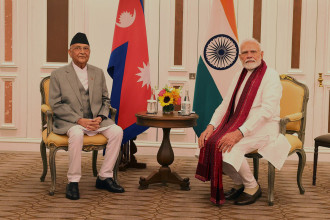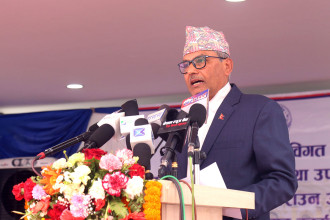-1717658416.jpg)
KATHMANDU: The abundant hydroelectric power is assisting Nepal in reducing its oil imports and enhancing its air quality, thanks to a surge in electric vehicle (EV) sales.
Nearly all of the electricity produced in the country is clean energy, with the majority generated by river-fed hydroelectricity. This plentiful power source is enabling the country to rapidly expand charging networks, and electric vehicle imports have doubled each year for the past two years, according to customs data.
The Nepal Electricity Authority (NEA) estimates that the use of electric vehicles has reduced oil import costs by $22 million annually, and these savings are increasing.
Access to electricity has soared over the past three decades as hydroelectric projects have been completed. Now, all but 6% of the population can access the country's rapidly expanding grid. This is allowing the country to outpace its neighbours in adopting EVs.
The country currently has the peak capacity to produce 2,600 megawatts (MW) of power, and this is increasing as new hydropower plants are completed. A very small amount of power is also generated by solar plants.
"Our electricity in the grid comes from hydropower, so it is clean energy. Therefore, the country is ideally positioned to use electricity to power our vehicles in the best way possible, which is that the energy source itself is clean. It is not coal, gas, nuclear or petroleum," said Kanak Mani Dixit, a prominent environmental and civil rights activist.
Official sales data were not available, but Chinese automaker BYD's Atto 3 and Indian maker Tata's Nexon appear to dominate sales of electric passenger sedans.
-1717658416.jpg)
The country has made increasing the use of EVs part of its national commitments to reducing climate-changing emissions, pledging to raise EVs to 25% of all auto sales by 2025 and 90% by 2030.
To help boost sales, the government is imposing lower duties on imported electric vehicles, ranging from 25% to 90%. The import duties on petrol and diesel-powered vehicles are 276% to 329%.
Charging stations being added
Sagar Mani Gnawali, who heads the agency's department responsible for Electric Vehicle Charging Infrastructure Development, said that there are currently 400 charging stations, and this number is expected to double within a year.
Jyotindra Sharma, a cardiac surgeon who has been driving an EV, 2019 KIA Niro, for four years, says he is pleased to know he is helping to reduce the smog that poses severe health hazards in the Kathmandu valley.
"I am extremely happy using an electric vehicle because I could contribute to the environment compared to petrol cars," he said. "The cost of electricity for charging and everything else is much less, and I got a much more luxurious car for the same price compared with petrol-fuelled cars," Sharma said.
EV enthusiasts also include drivers of small public vans who earn their living by transporting passengers around the city and beyond.
"It is very easy to drive, there is no pollution, and it's good for the environment. Not only that, it's good for the country as the nation's money does not go abroad to buy oil. There are benefits all around," said Bhakta Kumar Gupta, who drives people from Kathmandu to southern Nepal and back every day.
Gupta replaced his diesel-run van with an EV of the same size that can carry 10 passengers. It used to cost him $40 to buy diesel every day. Now, he says it costs about $6 to charge his van.
But while hundreds of small electric vans transport passengers on short routes, Kathmandu has very few electric buses, and none connect the capital with other cities. Pollution from buses and other vehicles, as well as from burning fuels for cooking and heating, made Kathmandu one of the world's most polluted cities for several days in April, as the government warned people to stay indoors.
Shifting to more EVs is crucial, said Dixit, the environmental activist. "We desperately need that for the sake of our health and the sake of our economy's health, individuals' health and our lungs as well as our national health," he said.
(With inputs from AP/RSS)


-1717658416.jpg)
-1717658416.jpg)

-1743868256.jpg)


-1743740348.jpg)